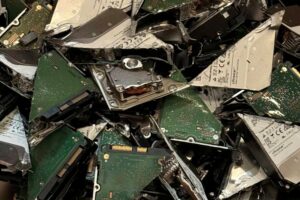A recent WSJ article points correctly to the fact that rare earth elements can be recycled from old hard disks, MRI scanners and other gear containing magnets made of rare-earth metals. The startup company Cyclic’s pitch is that this is faster than setting up new mining operations, which can take decades, and slashes carbon emissions and water use. The picture above is from their literature.
“What we are doing is disrupting that supply chain,” said Cyclic chief executive Ahmad Ghahreman.
The company has invented a process to separate rare-earth magnets from other metals, grind them to powder and use chemicals to extract rare-earth oxides—like hot water releasing caffeine from coffee, Ghahreman says. The company has a deal to supply oxides to Belgian chemicals company Solvay, which processes them to make metal for new magnets.
I applaud innovation of course, but the logistics of getting the candidate raw materials to the processing site and building such a site at scale to be meaningful in modern markets is daunting. Noble for sure … but daunting. And, if we are to learn anything from recycling plastics in everyday use, it just doesn’t work. Very little of discarded material is recycled … and mostly due to economics. It is cheaper to ship our sins to third world countries and to continue to sin.
You can legislate recycling and charge people per item as they do in the Northeast for plastic bottles, but I have yet to see a study showing that it is making a difference. Frankly, people would rather pay the fee than have their lives further complicated with multiple trash paths. In like manner, composting food waste is certainly a good idea if you have a garden, but very few will do it. Most who do will write articles and get covered by the local news media as heroes, but other than that …
Recycling has been proven to do one thing for sure … and that is to dull the guilt sensitivities of those who consume those goods in the first place. People today buy bottled water, and if you ask them, because they believe the bottles are recycled.
One more convenient myth used by marketers to dull our sensibilities.
2 thoughts on “Recycling Economics”
Comments are closed.

So true and something most don’t want to acknowledge. I applaud the noble attempts being made by some, but the magnitude of the challenge is daunting.
All great points, Joel, that very few understand-or care, as you say.